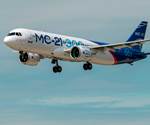MC-21 airliner faces one-year delay due to U.S. sanctions
The Russian airliner schedule will reportedly be delayed until 2021 as U.S. sanctions have interrupted the supply of composite materials for the aircraft.
Russia’s MC-21 airliner schedule will reportedly be delayed until 2021 according to a news story in Aviation Week.
During a Feb. 18 news conference at the International Defense Exhibition (IDEX), Sergey Chemezov, CEO of Russian state-owned holding conglomerate Rostec (Moscow, Russia) — who has launched an audit of the program after assuming ownership of the program from United Aircraft Corp. (UAC, Moscow, Russia) — reportedly claimed the delay was triggered by U.S. sanctions on production facilities and suppliers.
The sanctions are said to have prevented Hexcel (Stamford, Conn., U.S.) and Toray (Tokyo, Japan) from supplying composite materials for the aircraft and will likely cause disruption at the aircraft’s final assembly site in Irkutsk, Siberia. According to Chemezov, Rostec has commissioned Rosatom (Moscow, Russia) to develop and qualify replacement composite materials. He also stated that although delivery of PW1400G engines for the first batch of MC-21s is still expected from Pratt & Witney (East Hartford, Conn., U.S.), Rostec subsidiary United Engine Corp. is also working on its PD-14 turbofan as an alternative engine.
Related Content
-
Composites manufacturing for general aviation aircraft
General aviation, certified and experimental, has increasingly embraced composites over the decades, a path further driven by leveraged innovation in materials and processes and the evolving AAM market.
-
ASCEND program update: Designing next-gen, high-rate auto and aerospace composites
GKN Aerospace, McLaren Automotive and U.K.-based partners share goals and progress aiming at high-rate, Industry 4.0-enabled, sustainable materials and processes.
-
Infinite Composites: Type V tanks for space, hydrogen, automotive and more
After a decade of proving its linerless, weight-saving composite tanks with NASA and more than 30 aerospace companies, this CryoSphere pioneer is scaling for growth in commercial space and sustainable transportation on Earth.













